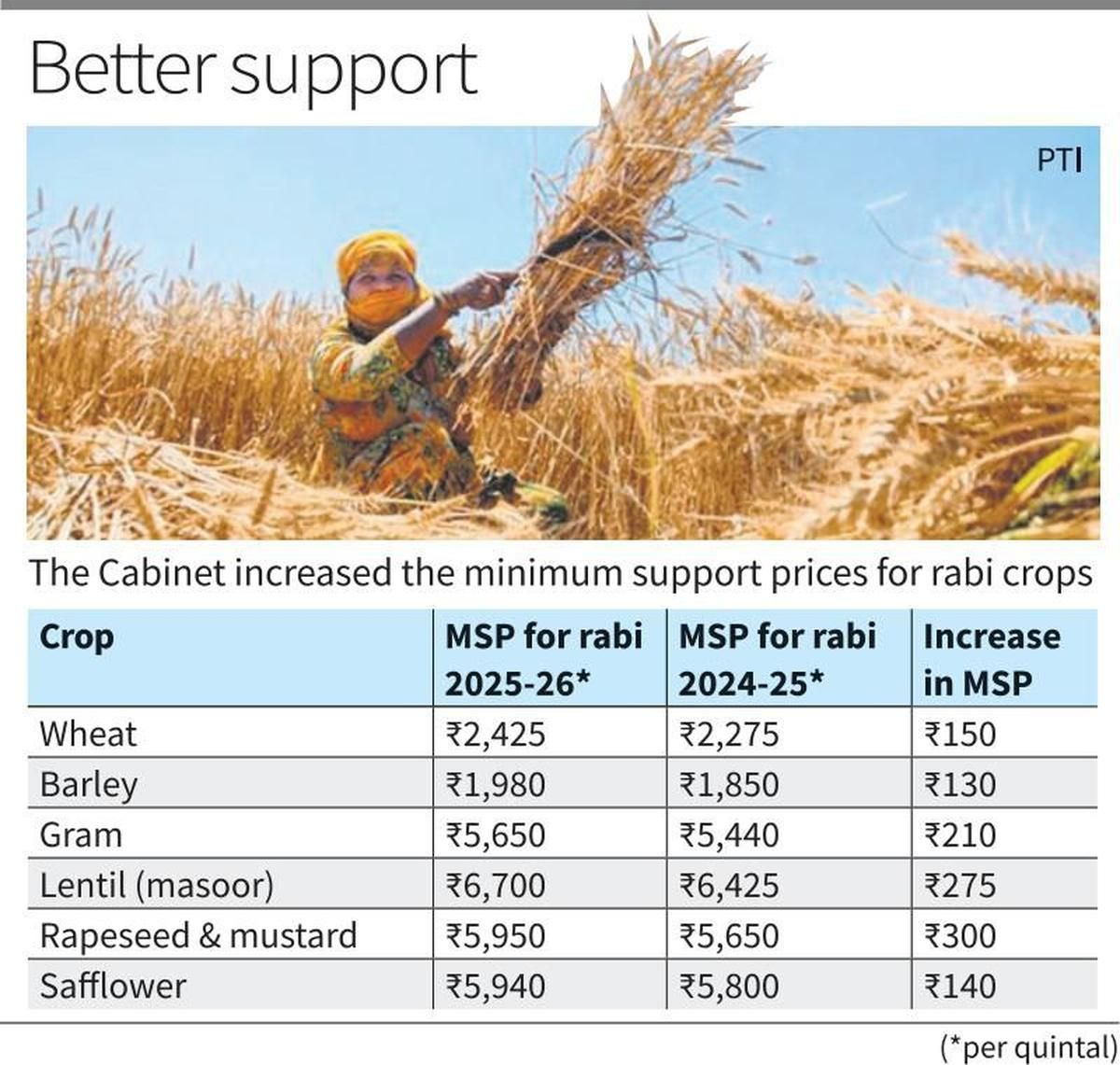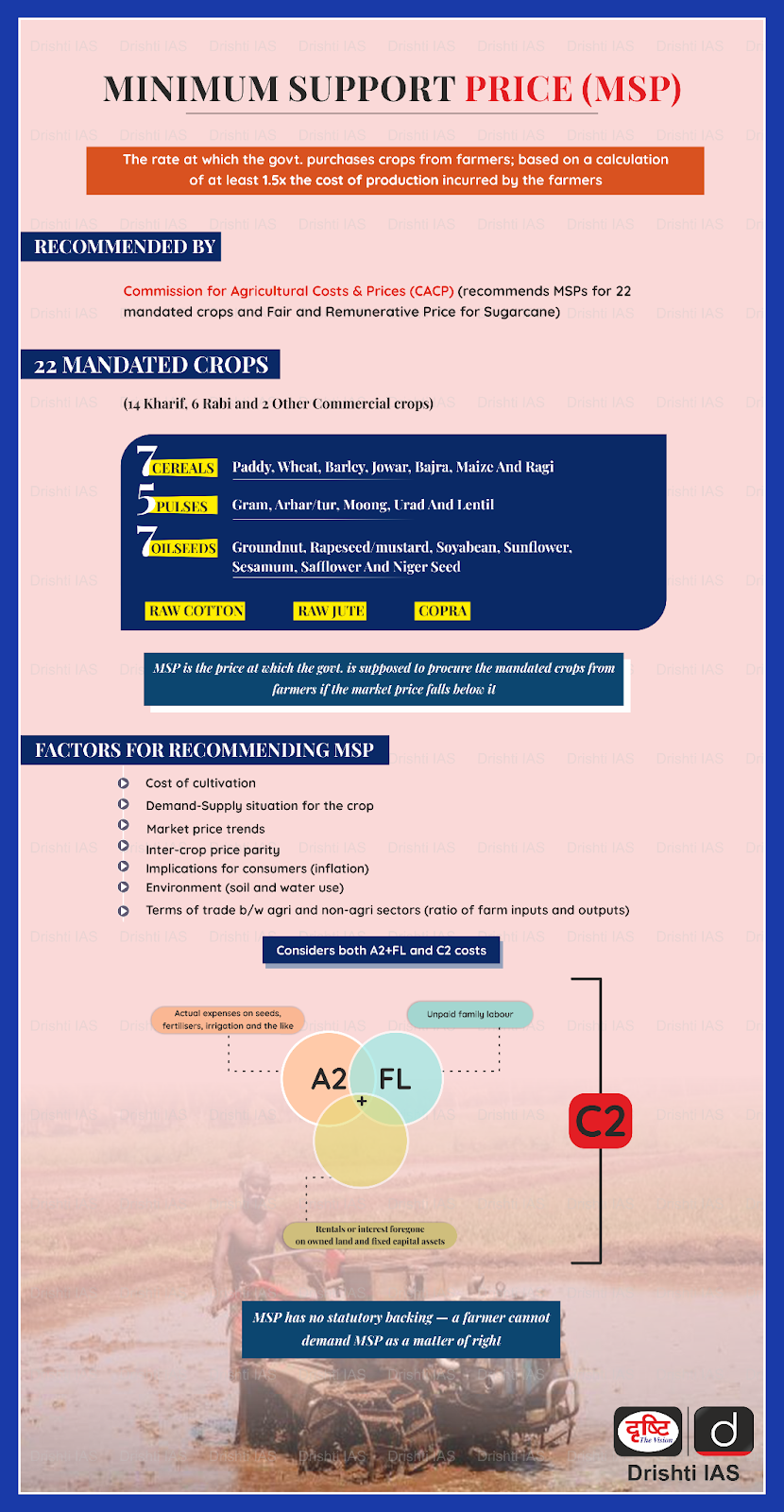MSP and its Legalisation | 21 Oct 2024
For Prelims: Cabinet Committee on Economic Affairs (CCEA), Rabi crops, Agricultural Prices Commission (APC), National food security, Food Corporation of India's (FCI).
For Mains: Issue of MSP legalisation, Impact of MSP legalisation of Farmers.
Why in News?
Recently, the Cabinet Committee on Economic Affairs (CCEA) increased the Minimum Support Price for six rabi crops (wheat, barley, gram, lentil, rapeseed, mustard, and safflowerfor).
- The increase of MSP ignited debate around the farmers' demand for the legalisation of MSP and its effect on the agricultural ecosystem.
Cabinet Committee on Economic Affairs (CCEA)
- It is chaired by the Prime Minister, and sets priorities for public sector investments.
- It continuously reviews economic trends to develop an integrated economic policy framework and oversees policies and activities in the economic field, including foreign investment, requiring high-level decisions.
What is the Minimum Support Price?
- About:
- The MSP regime was established in 1965 by setting up the Agricultural Prices Commission (APC) (later renamed as CACP) as a form of market intervention to enhance national food security and protect farmers from significant decline in market prices.
- MSP Calculation:
- The CACP calculates three categories of production costs for each crop, both at the state level and as all-India averages.
- A2: Covers all paid-out costs directly incurred by the farmer in cash and kind on seeds, fertilisers, pesticides, hired labour, leased-in land, fuel, irrigation, etc.
- A2+FL: Includes an estimated value of unpaid family labour with A2.
- C2: It is a more comprehensive cost that factors in rentals and interest for owned land and fixed capital assets, on top of A2+FL.
- The government maintains that the MSP was fixed at a level of at least 1.5 times the all-India weighted average Cost of Production (CoP), but it calculates this cost as 1.5 times the A2+FL cost.
- The CACP calculates three categories of production costs for each crop, both at the state level and as all-India averages.
What are the Concerns Related to MSP in India?
- Limited Coverage: According to the Shanta Kumar Committee's 2015 report, only 6% of farmers benefit from the MSP. Mainly those in regions with access to procurement infrastructure, such as Punjab and Haryana, while a large number of farmers in other states are left out.
- Skewed Crop Focus: The MSP system is focused primarily on a few crops, especially rice and wheat, leading to a lack of incentive for farmers to grow other crops, which affects crop diversification and can contribute to overproduction of these staple crops.
- Overburdening Procurement System: The MSP often leads to large-scale government procurement, especially of rice and wheat, causing storage challenges and wastage, and straining the Food Corporation of India's (FCI) resources.
- Environmental Impact: The focus on certain water-intensive crops like rice (supported by MSP) leads to environmental concerns such as groundwater depletion, particularly in regions like Punjab.
- Dependence on Middlemen: In some cases, even when MSP is declared, farmers face difficulties in accessing procurement agencies directly, leading to dependence on middlemen who may exploit them by offering lower prices.
What are the Needs and Challenges for Legalising MSP in India?
- Need:
- Income Security for Farmers: Legalising MSP would ensure guaranteed income for farmers, protecting them from fluctuations in market prices.
- Ensured income is crucial as many farmers face distress due to price crashes, especially during bumper harvests .
- Boost to Agricultural Investment: A legally guaranteed MSP can encourage farmers to invest more in agricultural inputs, modern technology, and sustainable farming practices.
- With assured returns, farmers are more likely to adopt measures that improve productivity and sustainability.
- Reduction of Rural Poverty: By offering a stable price, legal MSP can reduce rural poverty and improve the standard of living for small and marginal farmers.
- Stabilizing Agricultural Markets: MSP serves as a price stabilization tool, preventing the volatility of crop prices in open markets and reducing inflation burden on the consumer.
- The legal backing of MSP could smoothen supply chain and ensure consistent crop procurement.
- Mitigation of Distress Sales: Farmers often resort to distress sales due to a lack of remunerative prices. The legally enforcing MSP could prevent distress sale.
- Income Security for Farmers: Legalising MSP would ensure guaranteed income for farmers, protecting them from fluctuations in market prices.
- Challenges:
- Fiscal Burden on the Government: Legalising MSP across all crops would require the government to procure large quantities at assured prices, significantly increasing the fiscal burden.
- As per government, extending MSP to all farmers and crops could cost over Rs 10 lakh crore annually, which is financially unviable for the government.
- Market Distortion: Legal MSP could distort free market mechanisms by discouraging private traders and businesses from participating in the agricultural market.
- Excessive reliance on MSP could disrupt competitiveness in the domestic and export market and leads to legal battle for India at WTO.
- Storage and Infrastructure Constraints: Legalising MSP would require large-scale procurement, which in turn necessitates substantial improvements in storage and logistics infrastructure.
- The government faces storage limitations, with existing infrastructure being insufficient to handle an expanded procurement system for all crops .
- Implementation Challenges: Implementing MSP uniformly across India is challenging due to diverse agricultural practices and climates, making it hard to set MSP levels that benefit all farmers,
- Differences in production costs across states further complicate uniform MSP enforcement .
- Overproduction and Environmental Impact: Legalising MSP might incentivize overproduction of certain crops like wheat and rice, which are already extensively procured under the MSP system.
- This could lead to environmental degradation, including groundwater depletion and soil pollution.
- Fiscal Burden on the Government: Legalising MSP across all crops would require the government to procure large quantities at assured prices, significantly increasing the fiscal burden.
Way Forward
- Correcting MSP Implementation: Reform MSP to ensure it targets crops based on regional needs and market demand.
- Strengthen procurement infrastructure and encourage crop diversification to reduce over-reliance on specific crops like wheat and rice.
- Encourage Crop Diversification: The government should incentivise crop diversification to address the environmental and economic issues.
- MSP should be introduced or expanded for other crops, including pulses, oilseeds, and millets, to promote sustainable farming and reduce pressure on water resources.
- Direct Benefit Transfers (DBT): To reduce inefficiencies and curb the dependence on middlemen, the government can explore direct benefit transfers for farmers.
- This could allow farmers to receive the difference between the MSP and market price directly into their bank accounts if they cannot sell at MSP.
- Allied Activities for Farmers: Promote allied agricultural activities like horticulture, dairy farming, and fisheries to provide farmers with additional income sources, making agriculture more sustainable and less dependent on MSP.
- Skill Development for Manufacturing Jobs: Expand skill development programs to equip rural populations, particularly youth and women, with manufacturing and technical skills.
- This would create employment opportunities outside agriculture, supporting the transition to non-farm incomes.
|
Drishti Mains Question: Critically analyse the concerns associated with the legalisation of Minimum Support Price system and suggest a way forward. |
UPSC Civil Services Examination, Previous Year Question (PYQ)
Prelims:
Q. Consider the following statements: (2020)
- In the case of all cereals, pulses and oil-seeds, the procurement at Minimum Support Price (MSP) is unlimited in any State/UT of India.
- In the case of cereals and pulses, the MSP is fixed in any State/UT at a level to which the market price will never rise.
Which of the statements given above is/are correct?
(a) 1 only
(b) 2 only
(c) Both 1 and 2
(d) Neither 1 nor 2
Ans: (d)
Mains:
Q. What are the reformative steps taken by the Government to make the food grain distribution system more effective? (2019)


